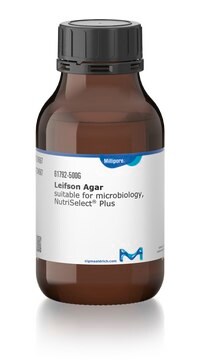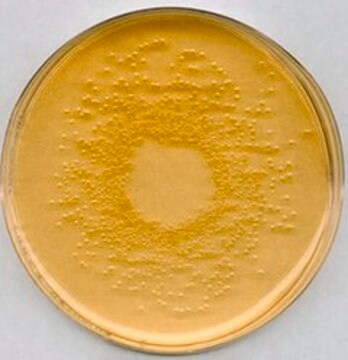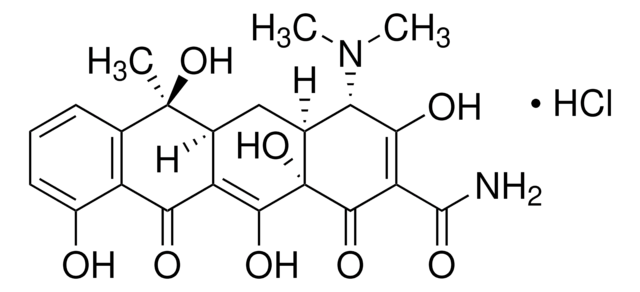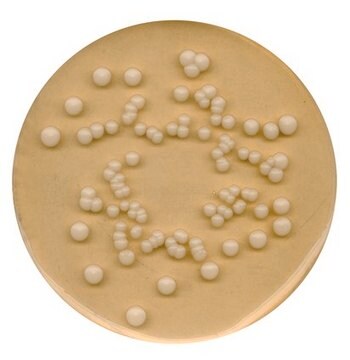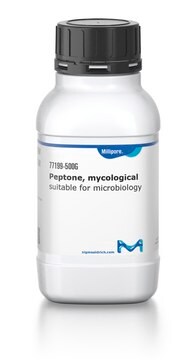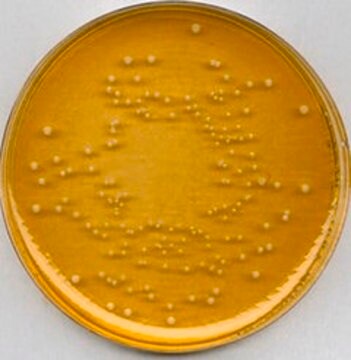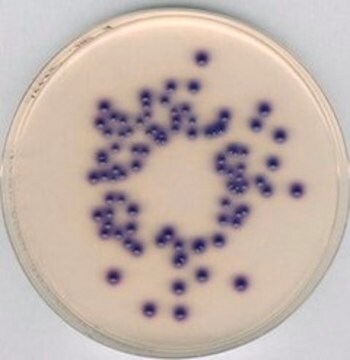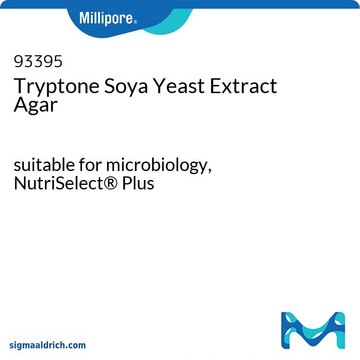75315
OF Test Nutrient Agar
suitable for microbiology, NutriSelect® Basic
Synonyme(s) :
Oxidative Fermentative Agar acc. to Hugh a. Leifson
About This Item
Produits recommandés
Stérilité
non-sterile
Niveau de qualité
Gamme de produits
BioChemika
Forme
powder
Durée de conservation
limited shelf life, expiry date on the label
Composition
agar, 2.5 g/L
bromothymol blue, 0.08 g/L
casein peptone (pancreatic), 2 g/L
dipotassium hydrogen phosphate, 0.3 g/L
sodium chloride, 5 g/L
Fabricant/nom de marque
NutriSelect® Basic
Technique(s)
microbe id | utilization test: suitable
microbiological culture: suitable
pH final
7.1±0.2 (25 °C)
Spectre d'activité de l'antibiotique
Gram-negative bacteria
Application(s)
agriculture
clinical testing
environmental
food and beverages
microbiology
Adéquation
Alcaligenes spp.
Chromobacterium spp.
Moraxella spp.
Pasteurella spp.
Acinetobacter spp.
Aeromonas spp.
flavobacteria
nonselective and differential for Bordetella spp.
nonselective and differential for Campylobacter spp.
nonselective and differential for Enterococcus spp.
nonselective and differential for Escherichia coli
nonselective and differential for Pseudomonas spp.
nonselective and differential for Salmonella spp.
nonselective and differential for Shigella spp.
nonselective and differential for Vibrio spp.
nonselective and differential for Yersinia spp.
nonselective and differential for bacteria (General Media)
nonselective and differential for coliforms
nonselective and differential for enterobacteriaceae
Application
Notes préparatoires
Autres remarques
Note de bas de page
The designations basic, plus, or prime are added to indicate the quality control level, from basic quality control to standard QC plus to prime for full regulatory compliance.
Informations légales
Code de la classe de stockage
11 - Combustible Solids
Classe de danger pour l'eau (WGK)
WGK 2
Point d'éclair (°F)
Not applicable
Point d'éclair (°C)
Not applicable
Équipement de protection individuelle
Eyeshields, Gloves, type N95 (US)
Faites votre choix parmi les versions les plus récentes :
Certificats d'analyse (COA)
Vous ne trouvez pas la bonne version ?
Si vous avez besoin d'une version particulière, vous pouvez rechercher un certificat spécifique par le numéro de lot.
Déjà en possession de ce produit ?
Retrouvez la documentation relative aux produits que vous avez récemment achetés dans la Bibliothèque de documents.
Les clients ont également consulté
Articles
Vibrio Detection
On the Trail of Campylobacter
Campylobacter spp. are regarded as the leading cause of bacterial gastroenteritis in humans worldwide.
Salmonella contamination is the second leading cause of food-borne illness worldwide. Controlling outbreaks of Salmonella is an important task for food regulators, restaurants and the food industry in general. The Salmonella family includes over 2,300 serotypes of bacteria, but two types, Salmonella enteritidis and Salmonella typhimurium, are responsible for about half of all human infections. Most outbreaks of Salmonella are traced back to dairy, poultry and meat products, but Salmonella can grow on nearly any food. Chicken, eggs and their derivative products are particularly high risk.
Notre équipe de scientifiques dispose d'une expérience dans tous les secteurs de la recherche, notamment en sciences de la vie, science des matériaux, synthèse chimique, chromatographie, analyse et dans de nombreux autres domaines..
Contacter notre Service technique